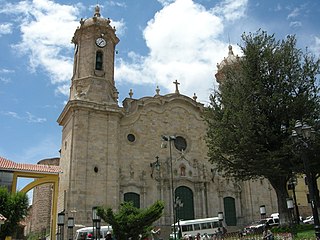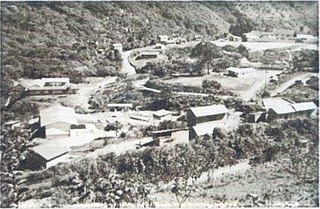
Lloyd Aéreo Boliviano (LAB), internationally known as LAB Bolivian Airlines, was the flag carrier and principal airline of Bolivia from 1925 until it ceased operations in 2010. It was the second oldest airline in South America after Avianca, and among the oldest airlines in the world. It operated scheduled domestic and international services to destinations in the Americas together with a transatlantic route to Madrid in Spain. It was headquartered in Cochabamba, having its main domestic hub at the city's Jorge Wilstermann International Airport, and international hubs at Viru Viru International Airport in Santa Cruz and El Alto International Airport in La Paz.

Pacajes is a province in the Bolivian department of La Paz. Its capital is Coro Coro.

Coroico is a town in Nor Yungas Province, in the La Paz Department of western Bolivia.
A territorial prelate is, in Catholic usage, a prelate whose geographic jurisdiction, called territorial prelature, generally does not belong to any diocese and is considered a particular church.

The Catholic Church in Bolivia is part of the worldwide Catholic Church, under the spiritual leadership of the Pope in Rome. Catholicism was introduced in the 1530s and the first diocese was established in 1552. Evangelization among the Indians bore much fruit from the mid-18th to early 19th century, resuming again in 1840. The country declared independence from Spain in 1825.

The Roman Catholic Archdiocese of La Paz is an archdiocese located in the city of La Paz in Bolivia.

The Roman Catholic Diocese of Coroico is a diocese located in the city of Coroico in the ecclesiastical province of La Paz in Bolivia.

The Roman Catholic Diocese of El Alto is a diocese located in the city of El Alto in the ecclesiastical province of La Paz in Bolivia.

The Roman Catholic Diocese of Potosí is a diocese located in the city of Potosí in the ecclesiastical province of Sucre in Bolivia.

The Roman Catholic Archdiocese of Cotabato is a metropolitan archdiocese of the Latin Church of the Catholic Church on the island of Mindanao, the Philippines. The archdiocese includes North Cotabato and the municipality of Banisilan, Cotabato.

The Arica–La Paz railway or Ferrocarril de Arica–La Paz (FCALP) was built by the Chilean government under the Treaty of Peace and Friendship of 1904 between Chile and Bolivia. The railway line was inaugurated on 13 May 1913 and is the shortest line from the Pacific Coast to Bolivia. It is 440 km (273 mi) long, of which 233 km (145 mi) is in Bolivian territory. The Railway is meter gauged. Until 1968, it was rack worked over a 43 km section, on the Chilean side, between Central and Puquios. The line reaches a height of 4257 meters above sea level at General Lagos. The Chile - Bolivia border is crossed between the stations of Visviri and Charaña. When the railway is in operation, it is used for the export of Bolivian minerals and some agricultural production as well as the import of merchandise into Bolivia.

Coro Coro Municipality is the first municipal section of the Pacajes Province in the La Paz Department, Bolivia. Its seat is Coro Coro.

Coro Coro is a small town in the La Paz Department in Bolivia. It is the seat of the Coro Coro Municipality, the first municipal section of the Pacajes Province, and it is the seat of the province. Coro Coro, also known as Corocoro, was one of the most important mining areas in Bolivia because of its copper deposits and was home to the Corocoro United Copper Mines. That changed after 1985 when due to various economic and political reasons the mining center was closed and its workers left the area. Since then, the development of the town has been stagnant. Coro Coro contains in its territory several natural heritage landmarks, such as Kuntur Jipiña, the salt lake of Jayuma Llallawa and the church of Qaqinkura (Caquingora).

Carmen Pampa is a community in Bolivia situated 112 km from La Paz. Carmen Pampa is in the municipality of Coroico, the capital of the Nor Yungas Province of the La Paz Department, Bolivia. According to Holdridge life zones classification, it is ecologically a premontane tropical moist forest. The population is composed mainly of Aymara people, mostly farmers. The community also hosts the Unidad Académica Campesina-Carmen Pampa and the San Francisco Xavier High School.

The Corocoro United Copper Mines, Ltd. was the largest copper mine in Bolivia, an honor previously held by Compania Corocoro de Bolivia. The corporate office was at 151 Finsbury Pavement House, London, England, while the mine office was at Coro Coro, Bolivia. It was organized August 6, 1909 under the laws of Great Britain. The lands included 515 claims in the Coro Coro district. The principal mines were the Wisk'achani, formerly owned by J. K. Child & Co., Ltd.; the Santa Rosa, formerly owned by Carreras Hermanos; and the Guallatiri, formerly owned by the Succession Noel Berthin. The mines were opened on two successive conglomerate strata of different geological horizons, and similar only in their origin and cupriferous nature. The mines are believed to have been worked by the Incas. The nearest water supply was the Rio Desaguadero, 14 miles (23 km) away, down which the copper was shipped by way of Puerto de Desaguadero, and from there to Mollendo, Chile, for export to Europe.

Toribio Ticona Porco is a Bolivian prelate of the Catholic Church. He was Prelate of the Territorial Prelature of Corocoro from 1992 to 2012 after serving as Auxiliary Bishop of Potosí from 1986 to 1992. Pope Francis made him a cardinal on 28 June 2018.
Jesús Agustín López de Lama was a Spanish Roman Catholic prelate.













